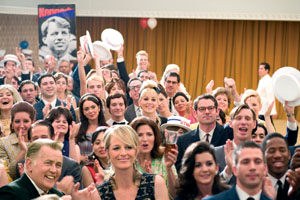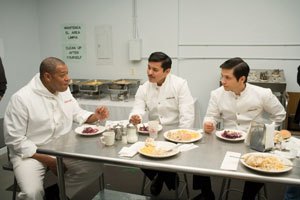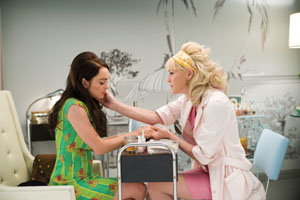Bobby
June 5 1968 saw the end of the hopes and dreams of millions of Americans when Robert F. Kennedy was assassinated at The Ambassador Hotel in Los Angeles. Coming so shortly after the shooting of Martin Luther King, not to mention JFK and Malcolm X, it seemed like the acid-inspired aspirations for universal peace and love had gone down in a hail of bullets. If anyone doubted there was a conspiracy to stop men living in peaceful harmony, they would only have to look at history. Since the Judeo-Roman killing of Christ, it is the great men of peace who have met untimely ends, and never the despots whom governments seemed incapable, or unwilling, to remove. Apart from the four previously mentioned, the names of Abraham Lincoln, Mahatma Gandhi, Pope John Paul 1 and John Lennon immediately spring to mind.

Emilio Estevez's film, Bobby, is not a conspiracy thriller, like Oliver Stone's JFK, nor is it a bio-pic like his Nixon. Bobby is much closer in look and feel to Irwin Allen's star-studded disaster movies of the Seventies, which were as much about the characters as the events surrounding them.
Bobby is set in The Ambassador Hotel during the day leading up to Kennedy's assassination, and focuses on the lives of hotel workers, guests and people from Bobby's campaign office, all of whom become affected by the tragic event. All these characters are fictitious, with only two of them being loosely based on real people, giving Estevez a lot more freedom and scope to develop the characters and story, by creating contemporary archetypes.

With an ensemble cast made up of some of Hollywood's elder statesmen (Harry Belafonte, Anthony Hopkins, Martin Sheen), Brat Pack veterans (Emilio Estevez, Demi Moore, Laurence Fishburne, Christian Slater) and today's young stars (Lindsay Lohan, Elijah Wood, Freddy Rodriguez, Ashton Kutcher), you get characters that fill the screen without ever dominating it. The different story threads weave in and out of each other, with no one story being more important than another. Some are comic, some are tragic but every one carries a message, not only about the era but also about the human condition. Some moments are truly memorable: Laurence Fishburne's speech to the Mexican staff about how to nobly overcome racism, Ashton Kutcher questioning the two interns' reason for taking drugs, Martin Sheen talking to his wife about the futility of materialism. However, it is the words of Robert F. Kennedy that have the most impact, particularly during the final ten minutes.

Rather than use an actor to portray Kennedy, the writer/director uses actual documentary and television footage from the era, which gives the film even more power. As one of Bobby's speeches plays over scenes of war, poverty, racial inequality and corporate corruption, you can't help thinking that nothing has changed in the last 40 years, except for the lack of altruistic statesmen.

Estevez captures the mood and the look of the era, and the loss of innocence that ensued. The clothes, hair and makeup rendered many of the actors unrecognisable, such as Sharon Stone and Ashton Kutcher. Stone, as the beautician wife of the hotel manager (William H. Macy), is completely devoid of any of the glamour for which she is renowned. Kutcher, as the hippy drug dealer, complete with long hair, must have taken lessons from his That 70s Show co-star, Tommy Chong. Although there were early mutterings of Oscar nomination for Demi Moore's portrayal of an alcoholic chanteuse, it is hard to fault almost any of the performances, or to isolate one as better than another, especially as they are all essentially cameos. Never has it been truer that the whole is greater than the sum of the parts.
Absorbing, entertaining and thought-provoking, Bobby is a film not to miss when it opens in cinemas from January 26.

Emilio Estevez's film, Bobby, is not a conspiracy thriller, like Oliver Stone's JFK, nor is it a bio-pic like his Nixon. Bobby is much closer in look and feel to Irwin Allen's star-studded disaster movies of the Seventies, which were as much about the characters as the events surrounding them.
Bobby is set in The Ambassador Hotel during the day leading up to Kennedy's assassination, and focuses on the lives of hotel workers, guests and people from Bobby's campaign office, all of whom become affected by the tragic event. All these characters are fictitious, with only two of them being loosely based on real people, giving Estevez a lot more freedom and scope to develop the characters and story, by creating contemporary archetypes.

With an ensemble cast made up of some of Hollywood's elder statesmen (Harry Belafonte, Anthony Hopkins, Martin Sheen), Brat Pack veterans (Emilio Estevez, Demi Moore, Laurence Fishburne, Christian Slater) and today's young stars (Lindsay Lohan, Elijah Wood, Freddy Rodriguez, Ashton Kutcher), you get characters that fill the screen without ever dominating it. The different story threads weave in and out of each other, with no one story being more important than another. Some are comic, some are tragic but every one carries a message, not only about the era but also about the human condition. Some moments are truly memorable: Laurence Fishburne's speech to the Mexican staff about how to nobly overcome racism, Ashton Kutcher questioning the two interns' reason for taking drugs, Martin Sheen talking to his wife about the futility of materialism. However, it is the words of Robert F. Kennedy that have the most impact, particularly during the final ten minutes.

Rather than use an actor to portray Kennedy, the writer/director uses actual documentary and television footage from the era, which gives the film even more power. As one of Bobby's speeches plays over scenes of war, poverty, racial inequality and corporate corruption, you can't help thinking that nothing has changed in the last 40 years, except for the lack of altruistic statesmen.

Estevez captures the mood and the look of the era, and the loss of innocence that ensued. The clothes, hair and makeup rendered many of the actors unrecognisable, such as Sharon Stone and Ashton Kutcher. Stone, as the beautician wife of the hotel manager (William H. Macy), is completely devoid of any of the glamour for which she is renowned. Kutcher, as the hippy drug dealer, complete with long hair, must have taken lessons from his That 70s Show co-star, Tommy Chong. Although there were early mutterings of Oscar nomination for Demi Moore's portrayal of an alcoholic chanteuse, it is hard to fault almost any of the performances, or to isolate one as better than another, especially as they are all essentially cameos. Never has it been truer that the whole is greater than the sum of the parts.
Absorbing, entertaining and thought-provoking, Bobby is a film not to miss when it opens in cinemas from January 26.

0 Comments:
Post a Comment
<< Home